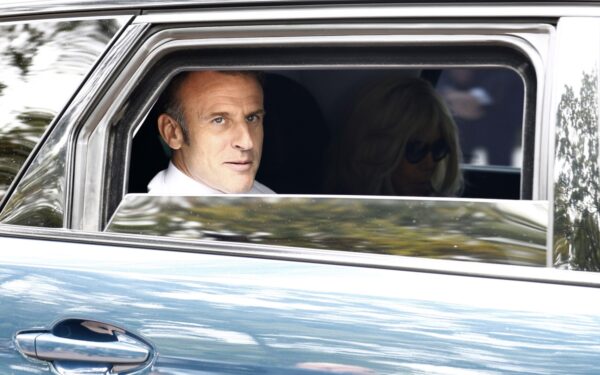Emmanuel Macron produced a maelstrom of controversy on Monday with what may strike the Anglo-Saxon reader as innocuous remarks. At a meeting of the French Bishops’ Conference, he said he wanted to improve relations between the state and church through a “dialogue of truth”, and that “a president of the French republic who takes no interest in the church and its Catholics would be failing in his duty”.
Such statements are normal amongst Western politicians. Even in Britain – where we “don’t do God”, as Alastair Campbell famously put it – party leaders with no interest or belief in the church and its doctrines will expound at length their ardent “respect” for “faith” and its “contributions to society”.
But Macron’s banalities were met with thunder. “Macron in full-on metaphysical delirium. Outrageous. We expect a president, but we get a little priest,” tweeted Jean-Luc Melenchon, leader of the Hard-Left France Insoumise and Macron’s principal parliamentary opponent.
That’s while Manuel Valls – former centrist prime minister under François Hollande – wrote on Twitter: “Secularism is France, and it has only one basis: the 1905 law, that of the separation of church and state. The law of 1905, the whole law, nothing but the law.”
“Secularism” is merely an English approximation of the untranslatable French word laïcité. It is too weak to properly render the Gallic concept’s cultural and historical significance. The word dates back to 1842, but the idea has its origins in the 1789 Revolution. This great rupture overthrew the Church as well as the monarchy (the two had been inextricably bound in the ancien regime).
The 1801 Concordat between Napoleon and Pope Pius VII provided a compromise between state and church: Catholicism was not recognised as the state religion, but it got official recognition as “the religion of the great majority of the French”. That failed to settle the issue. Nineteenth century French governance was a long, tense back-and-forth between Catholic monarchists and the Revolution’s heirs.
But after the creation of the Third Republic in 1870, amidst the broader Kulturkampf between the overweening power of the Catholic Church and modernising European nation-states, France’s anti-clericalists brought laïcité to the fore. Their 1905 law – the one extolled by Valls in his tweet of outrage – cemented it there.
The backbone of the law is the idea is that faith does not intrude on the state while the state does not intrude on faith. But it goes so far with the former principle as to effectively preclude the latter. Article 26, for example, forbids religious symbols “on public monuments or in any public place whatsoever, except for buildings used for worship, burial grounds in cemeteries, monuments and museums and exhibitions.”
This unduly expansive definition of religious incursion into the state sphere combines with laïcité’s place at the heart of France’s sacrosanct Republican dogma to produce some excellent and unintentional comedy – as Melenchon and Valls.
However, some prominent politicians’ utterances in the name of laïcité are worrying as well as ridiculous. Take for example Nicolas Sarkozy’s policy on school lunches, as set out during his unsuccessful 2016 comeback attempt: “If a little guy’s family does not eat pork and the menu at the canteen is a slice of ham and chips, well, he skips the ham and eats a double helping of chips”.
Laïcité is easy to weaponise in this way. It is a virtuous-looking Republican vessel through which supposedly mainstream politicians like Sarkozy can convey anti-minority messages to lure identitarian voters away from the National Front. Indeed, getting rid of halal and kosher school lunches follows logically from the 1905 law and the French Republican conception of égalité on which it based – absolute non-recognition of religion in the public sphere, no exception for any groups.
Macron has no interest in using laïcité like this – in facing off against Marine Le Pen in the second round of last year’s presidential elections, he did nothing to meet her halfway. But nor is he interested in modifying French Republican ideology. His silly plan to reintroduce national service and intransigence over Corsican regionalism show that all too well.
Indeed, the hysterical tweets of Melenchon and Valls bear some resemblance to Macron’s haughty dismissal of Corsican autonomists’ small demands. Both were overblown reactions, in the sacred name of “the values of the Republic”, to modest, harmless proposals. Being on the receiving end of it should remind Macron that those values are not – to use a common French expression – l’alpha et l’omega.



